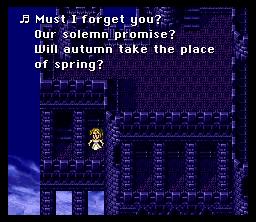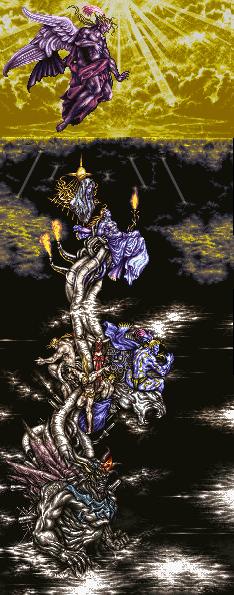Once again I return to this ongoing series, in which I attempt to play through every game in the Final Fantasy franchise that I can get my hands on, from FF1 through Lightning Returns, and a variety of the spinoffs and other titles not included in the ‘main series’. This list continues to undergo revision, and I seriously considered removing Final Fantasy 9 from it for personal reasons. In addition, no MMO titles will be played. Sorry, folks?
I think all of this is extremely important knowledge, and that the human race will be improved by my research. Let’s move on!
This is a bittersweet entry for me. Final Fantasy 6 has always been my favourite Final Fantasy. It is the first one that I played to completion, and I still think of it as the absolute pinnacle of the JRPG form. There are things about later games that I like, individually, better than certain aspects of Final Fantasy VI. But unless I really undergo a transformation moving forward in the series (or if Lightning Returns is somehow the greatest game ever released… and I doubt it) … this is the high point. This is the pinnacle. For me, this is the definitive FF experience, and the game I would recommend throughout this entire odyssey without hesitation to anyone, anywhere, anytime.
Version Played: GBA Remake
Version Notes: Having played the original SNES version 90282834 times (all numbers approximate) and the GBA version 0 times, this was kind of fun for me. The primary feature of the GBA version is a new, upgraded translation over the Ted Woolsey original. Obvious upgrades include the names of characters no longer being in all caps for whatever reason, and the expansion of several characters. I never thought that the original translation of FFVI was particularly egregious, but I will freely admit to liking the GBA translation better. The GBA version also fixes a number of rather infamous bugs from the original game, including the Evade bug. I would highly recommend this version to both new players and returning ones alike.
So… where to begin, really, with Final Fantasy VI? At the risk of exposing my knowledge of future games, I can certainly say that FFVI’s style paved the way for the characters and combat systems of Final Fantasy VII and Final Fantasy VIII. It also represents the only real departure (let’s not count FFI and FFIII where you have only ‘generic’ characters) in the entire Final Fantasy series from the idea of a single protagonist, with supporting characters around her. In this case, while Terra Branford is an obvious protagonist type, and does start the story as its central character, she remains such only until the first major split in the party, when Terra leads a group trying to escort the rebel leader Banon to safety on the Lete River… meanwhile, Locke Cole attempts to delay the impending invasion of the Gestahlian Empire from overrunning the peaceful realm of Figaro… and Sabin Figaro is lost on the Lete, and must make form new alliances to get back home.
Let the idea of that sink in, just a little. It’s a truly novel concept, and one that is not really used in any other RPG-style game that I can recall to mind. The ensemble cast of FFVI is not held together by the glue of Terra Branford, nor by any other single character. Certainly, the game has a few characters much more ‘major’ than others (Terra, Celes, and Locke receive a large amount of development over their fellow cast members), particularly if you don’t indulge in some of the sidequests that the game offers once you reach its second half.
If any single character provides focus to the narrative, then, it has to be the bad guy. Actually, in this case, as is often the case, there are a couple of them. The villains provide us with a single thread to follow through the complex characterizations and variety of locales that the party will explore. Ultimately, this game is about stopping the mighty Kefka from literally grinding the people of the world into dust, until nothing at all remains. While this has basically been the goal of every antagonist we’ve faced thus far (spoiler alert: probably most of the upcoming ones have the same plan in mind), Kefka begins to realize his goals in a visceral way which is, again, unusual for this game series.
Final Fantasy VI is also the first game to depart in a major way from several of the core story themes that we’ve seen before in every other installment. Gone are the crystals (Earth, Wind, Air, and Fire). Gone are prophecies of any kind – the people of Final Fantasy VI’s world are more worried about repeating the mistakes of the past through a cataclysmic conflict called the War of the Magi, which destroyed the world and erased magic, but also gave rise to the steam engine, and modern technology. It’s this technology, and this complete departure from the series’ roots that gives this game it’s unique flavour, and also very much sets the stage for the succeeding games.
Here, too, is another innovation, which in some ways builds on the stylings of Final Fantasy IV, but not entirely – each character here possesses a unique skill, such as ‘Steal’ for Locke, or ‘Morph’ for Terra (Cecil, for example, had ‘Darkness’, and Kain ‘Jump’). However, beyond that unique skill and their individual equipment lists, the characters have many interchangeable features. Their ability gain at level up is determined entirely by the Esper system, which also teaches characters magic. It is possible (albeit, pointlessly difficult and unrewarding) to turn even the most magically inept character like Edgar into a spellcasting powerhouse with the Ultima ability by the game’s end. While this was previously a function of jobs, the character ‘jobs’ in FFVI are immutable, though you have many characters to choose from by the end, unlike in Final Fantasy IV.
 None of this is why the game is so effective, however, or why its memory has lingered with me far beyond any other game in the series. The truth is, all of that has to be attributed by incredible moments, like the Opera House sequence, which elevate this game from a story perspective far beyond any previous offering. Its combat system may not be quite as fun to play with as FFV’s deep and immersive job system… but the characters will draw you in in a way that perhaps no other game in the series will.
None of this is why the game is so effective, however, or why its memory has lingered with me far beyond any other game in the series. The truth is, all of that has to be attributed by incredible moments, like the Opera House sequence, which elevate this game from a story perspective far beyond any previous offering. Its combat system may not be quite as fun to play with as FFV’s deep and immersive job system… but the characters will draw you in in a way that perhaps no other game in the series will.
After so many years, there’s not too much more to add here. Just know that if you have never experienced Final Fantasy VI, you are missing one of the great games of all time. That would be a shame.


